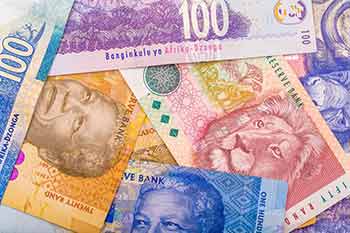The Euro to South African Rand (EUR/ZAR) exchange rate climbed to its strongest level since January on Tuesday as volatility on the global bond markets supported the Euro and negatively affected emerging market assets.
The Euro to South African Rand (EUR/ZAR) Exchange Rate Hit A Session High Of 13.6878
The Euro got the session off to a positive start on news that Greece successfully repaid €750 million to the International Monetary Fund (IMF). The news cause investors to sigh in relief and eased some of the concerns over a Greek default and possible exit from the Eurozone.
Positive data out of South Africa was unable to offer support to the Rand as the currency felt the effects of a broad sell-off of government bonds. The worries over Greece were also not over.
‘It’s just a follow-on on what’s happened internationally, with the US Treasuries having their biggest sell-off in a while, European bonds under pressure and that’s all on the back of Greece. Despite Greece making their payment to the IMF, they came out with a statement that their liquidity will be under severe pressure,’ said a bond trader at World Wide Capital Securities.
Analysts said the bond sell-off had been led again by German bunds, while US treasuries had weakened to five-month lows, with the negative sentiment adversely affecting foreign-exchange markets.
‘Remarkably, given the global volatility, the Rand is still trading against the US Dollar within existing ranges,’ said analyst John Cairns from Rand Merchant Bank.
Data released by Statistics South Africa showed that manufacturing production in Africa’s most advanced economy turned positive in March. The report showed that on an annual basis, manufacturing production increased by 3.8%. The data suggests that the sector was not that badly affected by power cuts, which have negatively influenced the economy.
The Euro to US Dollar (EUR/USD) Exchange Rate Advanced To A Session High Of 1.1279
The Euro advanced by more than 0.80% against the US Dollar as data out of the USA showed that the number of job openings in the world’s largest economy fell.
According to the Washington based Labour Departments Job Openings and Labour Turnover Survey (JOLT) survey, the number of new jobs fell under five million. Layoffs also increased, hitting nearly 1.8 million compared with 1.7 million a month earlier.
Further losses were somewhat restrained as a separate report showed that business optimism improved in April. The National Federation of Independent Business said on Tuesday its Small businesses Optimism Index rose 1.7 points to 96.9 last month. It is the latest sign the economy is clawing back after being slammed by a mix of bad weather, port disruptions, a strong US Dollar and deep spending cuts by energy firms.



